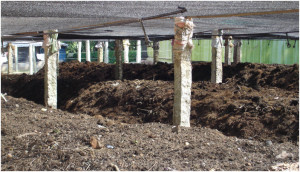What is Organic Farming ?
Organic farming is a technique, which involves cultivation of plants and rearing of animals in natural ways. This process involves the use of biological materials, avoiding synthetic substances to maintain soil fertility and ecological balance thereby minimizing pollution and wastage. It relies on ecologically balanced agricultural principles like crop rotation, green manure, organic waste, biological pest control, mineral and rock additives. Organic farming make use of pesticides and fertilizers if they are considered natural and avoids the use of various petrochemical fertilizers and pesticides.
International Federation of Organic Agriculture Movements (IFOAM), an international organization established in 1972 for organic farming organizations defines goal of organic farming as:
“Organic agriculture is a production system that sustains the health of soils, ecosystems and people. It relies on ecological processes, biodiversity and cycles adapted to local conditions, rather than the use of inputs with adverse effects. Organic agriculture combines tradition, innovation and science to benefit the shared environment and promote fair relationships and a good quality of life for all involved…”
Need for Organic Farming
The population of the planet is skyrocketing and providing food for the world is becoming extremely difficult. The need of the hour is sustainable cultivation and production of food for all. The Green Revolution and its chemical based technology are losing its appeal as dividends are falling and returns are unsustainable. Pollution and climate change are other negative externalities caused by use of fossil fuel based chemicals. As of 2012, the market for organic farming and other products has reached $63 billion worldwide.
Key features of Organic Farming
- Protecting soil quality using organic material and encouraging biological activity
- Indirect provision of crop nutrients using soil microorganisms
- Nitrogen fixation in soils using legumes
- Weed and pest control based on methods like crop rotation, biological diversity, natural predators, organic manures and suitable chemical, thermal and biological intervention
- Rearing of livestock, taking care of housing, nutrition, health, rearing and breeding
- Care for the larger environment and conservation of natural habitats and wild life
Four Principles of Organic Farming
- Principle of Health: Organic agriculture must contribute to the health and well being of soil, plants, animals, humans and the earth. It is the sustenance of mental, physical, ecological and social well being. For instance, it provides pollution and chemical free, nutritious food items for humans.
- Principle of Fairness: Fairness is evident in maintaining equity and justice of the shared planet both among humans and other living beings. Organic farming provides good quality of life and helps in reducing poverty. Natural resources must be judiciously used and preserved for future generations.
- Principle of Ecological Balance: Organic farming must be modeled on living ecological systems. Organic farming methods must fit the ecological balances and cycles in nature.
- Principle of Care: Organic agriculture should be practiced in a careful and responsible manner to benefit the present and future generations and the environment.
As opposed to modern and conventional agricultural methods, organic farming does not depend on synthetic chemicals. It utilizes natural, biological methods to build up soil fertility such as microbial activity boosting plant nutrition.
Secondly, multiple cropping practiced in organic farming boosts bio diversity which enhances productivity and resilience and contributes to a healthy farming system. Conventional farming systems use mono cropping that destroys the soil fertility.
Why is modern farming unsustainable?
- Loss of soil fertility due to excessive use of chemical fertilizers and lack of crop rotation.
- Nitrate run off during rains contaminates water resources.
- Soil erosion due to deep ploughing and heavy rains.
- More requirement of fuel for cultivation.
- Use of poisonous bio-cide sprays to curb pest and weeds.
- Cruelty to animals in their housing, feeding, breeding and slaughtering.
- Loss of biodiversity due to mono culture.
- Native animals and plants lose space to exotic species and hybrids.
Benefits of Organically Grown Food items and Agricultural Produce
- Better Nutrition: As compared to a longer time conventionally grown food, organic food is much richer in nutrients. Nutritional value of a food item is determined by its mineral and vitamin content. Organic farming enhances the nutrients of the soil which is passed on to the plants and animals.
- Free of poison: Organic farming does not make use of poisonous chemicals, pesticides and weedicides. Studies reveal that a large section of the population fed on toxic substances used in conventional agriculture have fallen prey to diseases like cancer. As organic farming avoids these toxins, it reduces the sickness and diseases due to them.
- Enhanced Taste: The quality of food is also determined by its taste. Organic food often tastes better than other food. The sugar content in organically grown fruits and vegetables provides them with extra taste. The quality of fruits and vegetables can be measured using Brix analysis.
- Longer shelf–life: Organic plants have greater metabolic and structural integrity in their cellular structure than conventional crops. This enables storage of organic food for a longer time.
Organic farming is preferred as it battles pests and weeds in a non-toxic manner, involves less input costs for cultivation and preserves the ecological balance while promoting biological diversity and protection of the environment.
Article By
– Rinkesh





Leave a Reply
Want to join the discussion?Feel free to contribute!